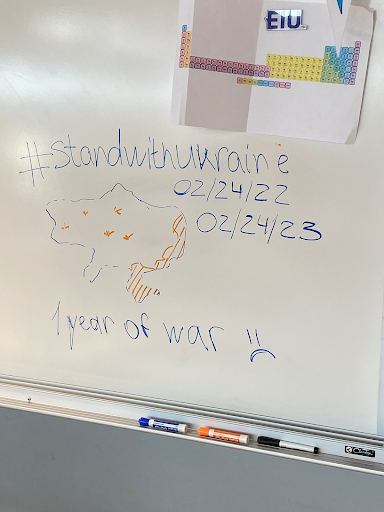The war in Ukraine: one year in

A whiteboard drawing noting the one year of war Ukraine has endured seen on Feb. 25 in the stem lab. Social Studies teacher Susan Theotokatos described the effect of the war in Ukraine, “Death and destruction has befallen much of Ukraine, especially in areas that have felt constant military bombardment.”
March 8, 2023
Feb. 24, 2023 marked the one year anniversary of the start of Russia’s “special military operation” in Ukraine. An estimation in Jan. by the Norwegian Chief of Defence claimed that 100,000+ Ukrainian forces and 180,000 Russian forces had been killed or wounded, with neither side seeming close to victory.
“Some could argue that it started in 2014 when he occupied the Crimean Peninsula, but that wasn’t so much militarily. It started with [the] invasion in 2022 in the spring [Russia] invaded territories that (Vladmir) Putin (President of Russia) thought rightfully still belonged to Russia and…had a lot of Russian people living there,” stated Thomas Kuhn, social studies teacher.
While Putin had hoped for a quick and decisive victory, the war has instead turned into a bitter stalemate, with Ukraine receiving massive amounts of aid from the U.S. and the EU.
“It seems like the people of Ukraine are very resilient and defiant in the face of this war and continue to fight,” said Social Studies teacher Susan Theotokatos.
Neil McCarthy, social studies teacher added on to this “I think we’re at a point where…it seems Putin is doubling down despite many losses and since the fall the Ukrainians have had very successful counter offensives in the south, in the eastern parts of the country, and now the Ukrainians are more on the offensive…they’re getting all sorts of great weapons…from our NATO allies, Australia, United States. So to me we’re at a point where it’s more of a stalemate.”
Kuhn compared the current conflict to past ones in history, “I think Ukraine’s held out a lot longer than people thought they would. They’ve banded together and many refugees have fled to Europe and the United States. But they held out against the Russian offensives and I think they’ve turned into kind of a war of attrition…similar to what happened in Vietnam and the American Revolution…which is just drag the war out and make it last as long as you can until you break the resolve in this case of the Russian people.”
The conflict has had great diplomatic impacts across the world, with the West united more than ever in support of Ukraine. It has even caused Finland and Sweden, two countries historically very devoted to staying neutral, to begin the process of joining NATO. The conflict has also led to China and Russia becoming closer.
“Putin [is] getting ever closer to Xi Jingping (President of the People’s Republic of China) and Beijing. I’m certain he (Putin) is saying ‘Look, the more you help me, the more I’ll support you and your efforts to seize Taiwan (a nation China views as part of China).’…That concerns me a great deal, because the timing would be right for China to do this, their economy is faltering, zero Covid was a disaster. Xi Jingping needs something to distract the masses with, nationalism usually does the trick. Taiwan would definitely get those flags waving,” said McCarthy.
Putin is an authoritarian leader like Jingping. Kuhn described what these leaders need to survive.
“So much of your legitimacy and your support comes from how popular you are and the support you have with the people. So to admit defeat would really weaken his (Putin’s) standing as a leader…It’s going to end on his terms…deciding when he’s going to stop fighting because Ukraine’s never going to invade Russia. So it’s just a question of when is he going to pull back enough…and how can he frame it as a victory even though it probably won’t be one,” stated Kuhn.
Ukraine and Russia have a very complex past, with Russia starting the war to take Luhansk and Donetsk, regions they have since annexed.
“The reasons for Russia’s attack on Ukraine has its roots in the fall of the Soviet Union. Ukraine had been part of the Russian Empire since Catherine the Great’s reign…Upon the breakup of the Soviet Union, Ukraine declared its independence in 1991. In the early 2010s the Russians annexed part of the Crimea and other disputed areas of Ukraine without much western reaction other than economic sanctions. Putin does not want NATO to further encroach towards Russia and did not want Ukraine gaining entrance into this supranational organization.”’ stated Theotokatos.
The U.S. has seen a wave of Ukrainian immigrants and has given a huge amount of aid to Ukraine. Kuhn compared the American public’s seeming disinterest in the war to previous conflicts, “Then you look throughout history and people paid attention to Vietnam for ten years, World War 2 or four years, Korea for three years, but the fact that we’ve lost so much interest in this, and this really is not even part of the national discussion really anymore, just shows you the shortening of our attention spans.”
McCarthy hopes for peace in this conflict, “I hope it’s that…they’re going to settle soon, because it’s been a humanitarian disaster among refugees, among people dead…and it just has an overall destabilizing effect on the world economy. So the sooner they resolve the better.”